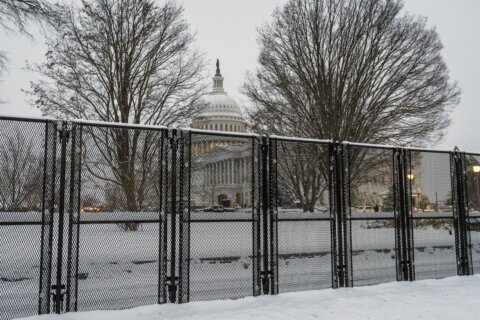NEW DELHI (AP) — India’s president inaugurated a new parliament on Thursday after national elections, listing the priorities of Prime Minister Narendra Modi’s government in coming years, including fast-tracking economic reforms and boosting small and medium-size enterprises to create jobs.
President Draupadi Murmu said India’s economy grew the fastest among the world’s major nations at an average of 8% over the past four years.
The International Monetary Fund has put India’s growth forecast at 6.8% for 2024-25.
Modi’s government was elected to a record third term despite failing to win a majority on its own. Modi is dependent on his Hindu nationalist party’s coalition partners to govern the country for another five years.
The government will present its 2024-25 budget next month, setting out its vision of making India a developed country by 2047, Murmu said in a speech to the lawmakers.
In India, the presidency is largely a ceremonial position and the prime minister governs the country.
The new parliament includes some unexpected winners, including Sikh separatist leader Amritpal Singh and Sarabjeet Singh Khalsa, the son of one of the assassins of then Prime Minister Indira Gandhi in 1984. They were elected from northern Punjab state.
Punjab suffered a bloody insurgency in the 1980s that led to Gandhi’s killing by her Sikh bodyguards at her official residence in New Delhi. Her assassination triggered bloody rioting by her Hindu supporters against Sikhs in northern India.
Another new lawmaker is Sheikh Abdul Rashid from Indian-controlled Kashmir. He was arrested in 2019 on terror-funding charges and is currently in jail.
Rashid’s Awami Ittehad Party has petitioned a Delhi court to allow him to participate the oath-taking ceremony in Parliament. Separatist groups have been fighting for the independence of Kashmir or its merger with Pakistan.
In January, the government unveiled a short-term budget ahead of the elections that boosted spending on infrastructure projects and homes for poor villagers and cut the fiscal deficit by reducing subsidies.
The Modi government announced plans to provide skills for young people and boost small and medium enterprises to create jobs. It faced criticism from the opposition during the election campaign for not creating enough jobs despite offering billions of dollars in subsidies to boost manufacturing.
The government plans to build 20 million affordable houses over the next five years, adding to the 30 million already built. The government allocated $145 billion for infrastructure projects.
The government’s budget last year totaled $550 billion and focused on ramping up capital spending to spur economic growth.
India attracted $596 billion in foreign direct investment over the past nine years.
Last year, India surpassed the United Kingdom to become the world’s fifth-largest economy with a GDP of $3.7 trillion. The government expects the economy to become the third largest in the next three years with a GDP of $5 trillion.
Copyright © 2025 The Associated Press. All rights reserved. This material may not be published, broadcast, written or redistributed.







